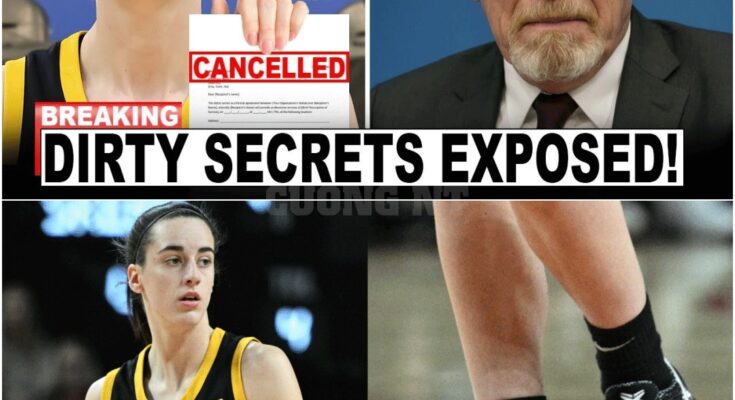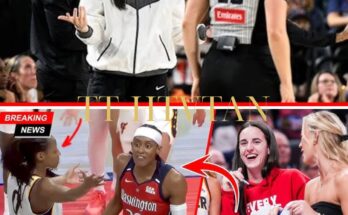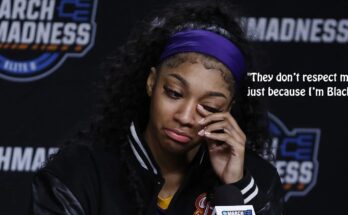Nike Backlash Grows After Insider Reveals Why Caitlin Clark Still Has No Signature Shoe
Nike is under fire once again—this time for what many fans are calling the blatant mishandling of Caitlin Clark, one of the biggest names in basketball today. Despite an 8-year, $28 million endorsement deal, Clark still doesn’t have her own signature shoe. The reason? According to a former Nike insider, the truth is far more frustrating than fans expected—and it’s fueling a public backlash the brand wasn’t prepared for.
When Nike signed Caitlin Clark, it was touted as a historic moment for women’s sports. Clark, the NCAA’s all-time leading scorer and now the face of the WNBA, had just broken records and brought millions of new fans to women’s basketball. Her deal with Nike was supposed to be a cultural milestone. Instead, it’s become a cautionary tale.

Despite her star status, Clark has yet to see even a single signature sneaker hit the shelves. According to former Nike basketball marketing director Jordan Rogers, the problem isn’t logistics—it’s priorities. Clark’s contract, while valued at $28 million over eight years, is heavily incentive-based. In reality, her base earnings in the first year are closer to $1.6 million, with future payouts tied to performance metrics, royalties, and sales. Worse, it includes performance reductions, meaning she could lose money for missing games or failing to meet certain on-court expectations.
That kind of deal doesn’t sound like it was built to uplift a generational talent. It sounds like a calculated risk management move designed to limit Nike’s payout while keeping up appearances.
Adding insult to injury, Nike has offered Clark little to no promotional support. No national commercials. No marketing campaigns. No branded apparel. Instead of a signature sneaker, she’s been given player-exclusive Kobes—basically hand-me-downs. Meanwhile, other WNBA players like Angel Reese have already launched their own signature shoes. The optics are hard to ignore.
Jordan Rogers didn’t hold back. In recent interviews, he slammed Nike for failing to recognize Clark’s influence, calling their actions a “massive failure” and suggesting internal politics were at play. According to Rogers, Nike was worried that fast-tracking Clark’s success could eclipse the rollout of other athletes, like A’ja Wilson. The brand, he claims, is playing it safe, afraid to fully commit to Clark’s meteoric rise for fear of “outshining” the rest of their roster.

But Clark isn’t just any rising star. She’s the biggest thing to happen to women’s basketball in decades. After drawing over 20 million viewers during the NCAA championship and continuing to break records in the WNBA, she’s proved herself as a cultural force. Fans want her merch. They’re ready to buy her shoes. Yet Nike remains eerily quiet.
Critics say this silence isn’t just a PR blunder—it’s symbolic of a bigger issue. Women athletes, no matter how successful, are still fighting for equal recognition, even from sponsors who claim to support them. This isn’t the first time Nike has fumbled when it comes to women in sports. Serena Williams and Allyson Felix both made headlines for calling out the brand’s lackluster support and unfair treatment.
And now, Caitlin Clark may be the latest victim of this trend.
What makes it worse is that brands like Gatorade, State Farm, and Wilson have all figured out how to leverage Clark’s star power in bold and creative ways. Meanwhile, Nike—the largest sportswear company in the world—has been oddly hesitant. They’ve teased a personalized logo and hinted at a signature shoe “in development,” but there’s still no release date, no rollout, and no clear plan. For Clark’s fans, that’s not just a delay—it’s a letdown.

Speculation continues to swirl. Some insiders suggest the delay is part of a wider strategy to avoid controversy in an already politically charged sports landscape. Others believe it’s just corporate indecision. Either way, the result is the same: Caitlin Clark, a once-in-a-generation athlete, is being sidelined not by opponents on the court—but by the very company that should be elevating her.
So what’s next? Will Clark stick with Nike and hope they finally deliver on their promises? Or will she take a bold step and switch to a competitor—Adidas, Puma, or even her own brand?
Whatever she decides, one thing is clear: the fans are watching, and patience is running out.



